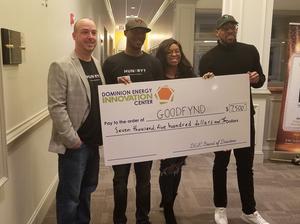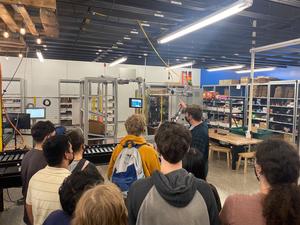
The 300-year-old insurance industry has been in the throes of digital disruption for the past half-decade, but being so highly regulated, it's a tricky industry to get into.
Hundreds of insurtech startups have cropped up to take advantage of the opportunities availed by technology, but dozens of companies have ended up in the insurance graveyard, and only a few are making serious headway.
One of those, Fenris Digital, is in Richmond’s own backyard.
Fenris Digital is a business-to-business technology company that uses data to help insurance companies improve their customer application process.
Insurance companies want to know about who they’re insuring, for better forecasting and risk assessment, so Fenris' software aims to make the customer journey as frictionless as possible.
The startup announced this month that SixThirty, a global fintech venture fund and business development program located in St. Louis, invested an undisclosed amount in the company. According to the fund’s website, SixThirty provides up to $250,000 in funding for startups.
Jennifer Linton, CEO of Fenris Digital, said the fresh funding and partnership will help her team enter other financial services markets and launch a “couple new products” every quarter.
Until then, Fenris Digital had been self-funded from Linton’s previous exit as an entrepreneur.
Prior to the insurtech venture, Linton headed up the U.S. launch team for 900-employee company Elephant Auto Insurance in 2009. From there, she joined DriveFactor, a venture-backed telematics service provider, as CMO.
Most recently in 2015, Linton worked at Allianz, one of the world's largest insurance companies, where she held a growth role created uniquely for her.
The idea for Fenris began while Linton was at Elephant. She saw how consumers were struggling to input their information into long-form applications. The abandonment rate was high, causing her company’s customer acquisition cost to be hundreds of dollars, she said.
In 2016, Linton joined Lighthouse Labs to begin building Fenris, a suite of tools that makes the application process easier for users and simpler for insurance companies to parse the data.
For example, using its database of 300 million records, Fenris’ tool “Application Fill” lets insurers reduce the average number of questions in their forms from 50 to five. Users enter basic information such as their names and date of birth and Fenris supplements the remaining questions via its database.
The core innovation of Fenris is scoring. Fenris assigns a score, built from a comprehensive database and machine learning, to an applicant that enables insurers to select the best leads to market to, resulting in better conversion rates. A Fenris score reveals helpful insights about an applicant, such as contact-ability, fraud indications, propensity to buy and lifetime value.
Linton gave Richmond Inno a demo of the latest technology that Fenris’ 12-person team has developed, LicenseSnap: a web application that lets users start filling out an application by snapping a picture of their license with a smartphone. In one test with 10,000 users across multiple states, 70 percent of users took a picture of their license using LicenseSnap.
“We’re providing a piece that nobody else seems to be doing,” said Linton. “We’re not selling to a ton of customers. We’re a service provider for insurance and financial services companies.”
She said the service they provide helps underwriters avoid chasing the wrong business.
“We’ve brought together data sets that nobody has tapped into before, allowing us to provide more insights that help weed out higher-risk clients.”
Fenris is still early-stage but positioned well – the company is adding two to three clients per quarter – to raise funding and step on the gas, she said.
As a founder in her forties, Linton has learned the importance of testing your startup ideas first by talking to 100 other people who don’t think like you.
“Even if you have lived it yourself, you might have a bias,” she said.
Linton also feels passionately about increasing the pool of female founders in the startup community.
“Pitchbook will tell you just under 3 percent of VC funding goes to female founders,” she said. “There are not enough female founders and investors today and we’re missing out on very creative talent because of it.”




